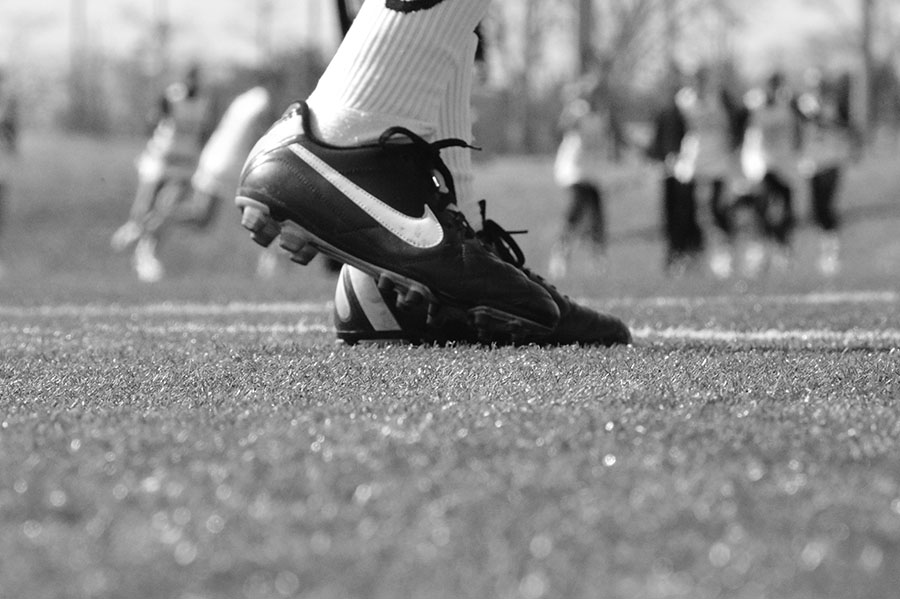
When junior Ian Albert goes home after soccer practice, the crumb rubber of the turf field goes with him.
“When I go home and take a shower, my mom gets mad because when I take off [my soccer gear] there are little black [crumbs] everywhere around the house,” Albert said.
Glenbrook North has had its artificial turf for two years. According to Athletic Director John Catalano, there may be anywhere from 1,000 to 1,500 different students on the field weekly during the spring sports season.
Having been on the turf regularly as the goalie of the boys soccer team this past fall, Albert said he understands why there is rising concern about the supposed danger of turf.
“I could see why they would be scared,” said Albert. “I know that a lot of people I know wouldn’t play on the turf [if there was a link to cancer], and my mom probably wouldn’t want me to play [on the turf].”
According to Bruce Brockstein, medical director of the Kellogg Cancer Center at NorthShore University HealthSystem, the crumb rubber in the artificial turf may contain cancer-causing agents.
Brockstein said the crumb rubber is made up of recycled rubber, which contains a number of different potential carcinogens, like volatile hydrocarbons. These may be carcinogenic, or may cause cancer, if they are inhaled, eaten or absorbed through cuts in the skin. One of the chemicals in crumb rubber, benzine, is linked to causing leukemia.
Sophomore Callie Williams said that since she is a goalie on the girls soccer team and is on the turf often, the crumb rubber ends up wherever she goes.
“[The crumb rubber is] everywhere,” said Williams. “It’s in my bed, it’s in my room, it’s everywhere… If I fall or dive, it’s always in my shirt and it gets in my mouth, so [I] have to pick it out or spit it out.”
Hematologist and oncologist Harvey Einhorn said that when referring to carcinogens causing the development of a cancer over prolonged exposure, it is generally thought of in terms of years or even decades.
Einhorn said if a person is unusually susceptible to developing cancer, possibly due to his or her genetics, then even a slight exposure to carcinogens can be enough to cause cancer in that individual compared to another individual who may not be as susceptible.
He said he can only speculate and would not feel comfortable giving any hard, definitive answers or opinions regarding the possibility that the crumb rubber causes cancer.
Brockstein shares similar views.
“I am concerned based on what I’ve heard, but as a scientist and oncologist, I am very cautious about making [the association that the turf causes cancer] without actually having all of the scientific data,” Brockstein said.
Junior Colette Carroll said that after her third lacrosse practice, there was crumb rubber in her bed, boots, hair and mouthguard. She said the possible link to cancer is frightening for athletes who play on the turf because they find themselves continuously surrounded by the crumb rubber, even in their beds.
Brockstein said, based on the uncertain relationship between crumb rubber exposure and the development of cancer, there are precautionary steps students can take to avoid overexposure to these potential carcinogens.
Students and faculty members should attempt to minimize the amount of time spent practicing on turf, particularly goalies who are highly exposed to crumb rubber when diving on turf, Brockstein said. Students should wear skin protection to shield any wounds, keep water nearby to rinse their mouths if crumb rubber enters their mouths and shower to limit the exposure time of the chemicals on their clothes and bodies.
“It’s such a difficult time for people when their son or daughter is diagnosed with [cancer], and people are looking for answers or trying to find solutions,” said Catalano. “I can understand that, but I just don’t see, after the reviews I’ve read and after the conversations that I’ve had, I just don’t see the connections between the [turf and cancer].”

